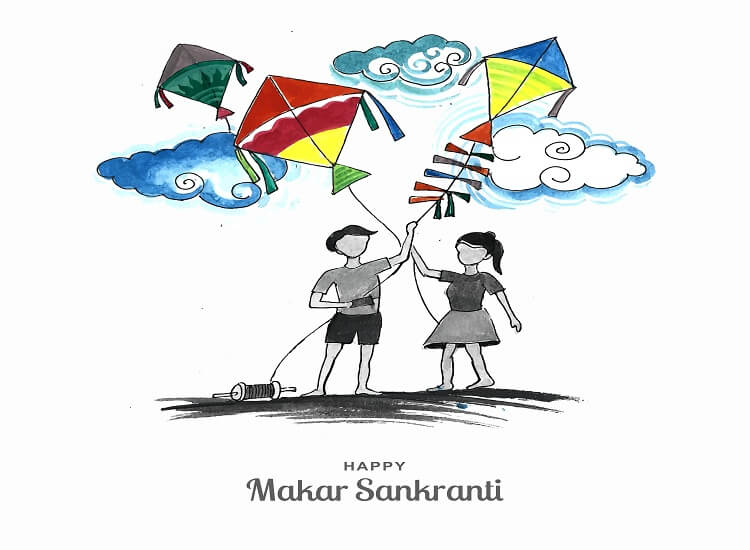Makar Sankranti Celebration for Kids: Ideas for Makar Sankranti, Lohri & Pongal Celebration


Many of us enjoy the festive period and the traditions that go along with it. Others prefer the concept of taking vacations because of festivals, and they appreciate the break from their regular routine.
Our children enjoy the holiday season as well and look forward to a vacation from their studies and schoolwork. Varied personalities have different perspectives on festivals. We grown-ups take the festive spirit really well but this might not be the same with our kids, as they are too young to understand the significance.
The celebration of Makar Sankranti is going on, and here are some ideas to make it better with your kids. Read on to learn about Makar Sanrati, Lohri and Pongal festivals.
Learning courses for your kids! Get free trial here
What is Makar Sankranti?
You’ve probably learned about Makar Sankranti in school, but here’s a little more information. Makar Sankranti is an Indian Hindu harvest festival that commemorates the end of winter and the start of longer days as the sun moves northward. Uttarayan is another name for this era, and it is said to be exceedingly lucky. The harvest festival is a spiritual and seasonal celebration that marks the coming of the sun in Makara and praises Lord Surya, the Sun God (Capricorn).


Celebration Reason
Sankranti is revered as a deity. Legend has it that Sankranti vanquished the devil Sankarasur. The day after Makar Sankrant is known as Karidin or Kinkrant. On this day, Devi vanquished the devil Kinkarasur.
“The interval between Makar Sankranti and 40 ghatis (approximately 16 hours for Indian locales if 1 ghati length is 24 minutes) from Makar Sankranti is regarded suitable for auspicious activities,” according to Drik Panchang. Punya Kaal is the name given to this period of time.”
During Punya Kaal, Sankranti practises like bathing, offering Naivedhya (food given to the deity), giving charity or Dakshina, completing Shraddha rituals, and breaking fast should be performed. All Punya Kaal rituals are deferred till the next sunrise if Makar Sankranti falls after sundown.
Also Read: Kite Making for Kids: Interesting Kites Facts for Kids Learning
Kids Celebration of Makar Sankranti
On Makar Sankranti 2022, we bring you interesting ideas on how to enjoy the festival with your kids.
# Tell them about the festival
# Make kites with them
# Cook delicacies with them
# Make rangoli
# Visit fairs
What is Lohri?
Lohri, which falls the night before Makar Sankranti, is a popular winter traditional festival in North India, as well as a famous harvest festival for farmers. It marks the end of the Winter Solstice and the beginning of longer days as the sun moves closer to the northern latitudes.
Lohri signifies the end of the winters and the start of a new harvesting season because the Earth is closest to the sun at this period. It is mostly observed by Sikh and Hindu groups in the Punjab area of India.
Celebration Reason
The tale of ‘Dulla Bhatti,’ a hometown hero of the Punjab province who, during the rule of the Mughal Emperor, Akbar, worked as a messiah of the people and was known as the ‘Robin Hood’ of Punjab because he would thieve from the rich to provide for the needy, is said to have inspired the celebration of Lohri. He is best known for rescuing a bunch of young girls from enslavement.
He’d arrange for the girls’ marriages to village males and provide them with dowries from the wealth he’d stolen. His acts have been passed down through the generations as legends and are strongly embedded in Punjabi culture.
Lohri Celebration for Kids Ideas
# Read books
# Plant a garden
# Make mini tea light bonfires
# Have a popcorn party
# Make Lohri bonfire cupcakes and sweets
What is Pongal?
Pongal is a celebration of thanksgiving that takes place all over Southern India. The word Pongal comes from Tamil literature and literally means ‘to boil.’ Pongal also refers to a rice-based delicacy that is served during the celebration. It’s a harvest festival which is the only one that follows the solar calendar.
This celebration takes place every year on January 14th. Pongal symbolises the beginning of the sun’s six-month journey to the north. In contrast to the sun’s Southern migration, it is said to be extremely auspicious.
Also Read: New Year Resolutions for Kids: Start 2022 with Full of Energy, Fun and Excitement
Celebration Reason
Festivals in India are constantly associated with legends, significance, and myths. Although there are many legends associated with Pongal, the following two are the most well-known.
First Legend
According to mythology, Lord Shiva once sent his bull, Basava, down to the world and instructed the people to eat once monthly, have an oil massage once a day, and bathe daily. Basava mistakenly declared, unintentionally, that everyone should take an oil bath once a day and eat every day.
Lord Shiva’s wrath was so great that he exiled Basava to the soil for all eternity. On Earth, he would be expected to assist the people in producing more food and thereby assisting them. This could explain why cattle are still associated with them now.
Second legend
Lord Krishna and Lord Indra are the subjects of this legend. According to tradition, Lord Krishna chose to teach Lord Indra a lesson when he was a youngster because he had grown haughty after becoming the monarch of the deities.
Lord Krishna had enraged Lord Indra by requesting that all cowherders cease worshipping him. He then unleashed his devastation clouds, causing thunderstorms and floods.
Lord Krishna then lifted Govardhan Mountain, offering shelter for all creatures and demonstrating his divinity to Lord Indra. Lord Indra’s false pride was crushed as a result of this, and he apologised to Lord Krishna.
Conclusion
For everybody, the festive season is the most wonderful time of the year. We are from a country that is known for its festivals and celebrations. Each event has its own significance and significance.
Every celebration gives joy and harmony to our rituals and traditions. It is critical that we instil in our children the importance of festivals. Our children should be taught the actual significance of festival rituals, cultures, and dedication.
Get your kids to learn more about India’s culture by reading The Real School Of Montessori daily blogs.
Also Read: New Year Activities for Kids: Let’s Enjoy the New Year With the Best Games and Activities!
Learning courses for your kids! Get free trial here
Recent Posts
What are the Advantages of Online Teaching at The Real School?
In the article -"What are the Advantages of Online Teaching at The Real School?" we…
What is the Full Form of School?: Unveiling the Acronym
The term "school" carries profound significance in the realm of education, representing more than just…
What is Math Full Form?: Cracking the Code
Mathematics, often referred to as "Math," is a subject that elicits various reactions from students…
What is Full Form of Homework?: Decoding Academics
Homework, an integral part of the academic journey, often raises questions about its purpose and…
What is Full Form of Teacher?: Demystifying Education
In the intricate tapestry of education, teachers stand as the pillars shaping the intellectual and…
What is Real Education?: Discovering Its Essence and Impact
The concept of real education is evolving, transcending traditional views that equate it solely with…

